Resource Hub: Chronic Kidney Disease (CKD) screening
This hub provides practical, evidence-based resources to support GPs participating in EMPHN’s Clinical Insights CKD screening pilot program.
The program is based on the Kidney Health Australia (KHA) Guidelines: CKD Management in Primary Care, 5th Edition.
Additional resources to support decision-making and patient care are available below.
On this page:
Data sources and definitions
| Data sources |
|---|
| Data in this report are based on what is recorded in the designated fields in the clinical software at your practice and uploaded to POLAR. POLAR is unable to extract data from progress notes. |
| POLAR can only capture Blood Pressure (BP) that is recorded in the measurement field of your clinical software. |
| Pathology test ordering dates for eGFR and urinary ACR are not reliably captured. Collection, reporting, and test dates are used as proxies. |
| Term | Definition |
|---|---|
| RACGP active patients | Patients who have attended the practice 3 or more times in the past 2 years. |
| Patient allocation to GP | A patients is allocated to the GP who has the highest number of the patient’s records in the last 2 years (i.e. at least >50% of the time). If a patient doesn’t see any GP for >50% of the time, they will be allocated to the GP they last saw. |
| Conditions included and excluded | Conditions included Hypertension Diabetes Conditions excluded Patients with diagnosed Chronic Kidney Disease (CKD) or had a nephrectomy have been excluded in the report. Find a comprehensive list of conditions here. |
Resources
How this information can be used to improve patient care
Accessing patient data: To view the list of patients, click on the link in your Clinical Insights report ‘Visit POLAR here’.
The link will take you to a live report in POLAR Explorer where you can see a list of your re-identified patients. View example of patient list.
If you’re not already logged in to POLAR Explorer, when you click on the link you’ll need to LOG IN first and validate your email address and mobile number before being redirected to your patient list. View various POLAR walkthrough step-by-step guides designed to help you navigate POLAR.
Your clinical software provider can provide support with recalling patients via your clinical software.
Recalling patients: Consider which patients on the list should be reviewed. View the below text/email template to support you with patient recalls.
Email template to recall patients with CKD:
Subject: Book Your Kidney Health Check
Dear [Patient First Name],
As part of your regular care, we’d like to invite you for a check-in to support your kidney health. This appointment will help us make sure everything’s on track and gives you a chance to ask any questions. You can book online at [Booking Link] or call us on [Clinic Phone Number].
If you have any questions or need assistance, feel free to contact us.
Kind regards,
[Your Clinic Name]
Chronic Condition Management Plan: Some patients may be eligible for a GP Chronic Condition Management Plan. Guidance and templates for Chronic Conditions Management Plan is available via Services Australia: GP chronic condition management plan – Health professionals – Services Australia
Latest news as of 1 July 2025 for Chronic Conditions Management Plan items can be found via the following news article: New GP Chronic Conditions Management Framework and MBS Items in effect from 1 July 2025 – EMPHN
Understanding and navigating POLAR
POLAR walkthroughs are short step-by-step guides designed to help you navigate POLAR.
How to log onto POLAR:
- Go to: polarexplorer.org.au/login
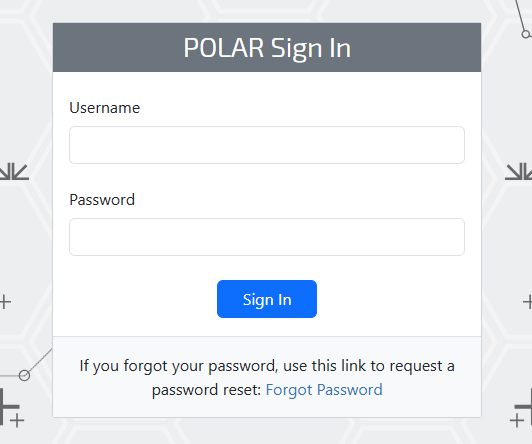
- Note if you do not have a user login set up contact your POLAR administration or digitalhealth@emphn.org.au.
- The first time you login you will be asked to validate your details with a code that will be sent to your email address and mobile phone number.
Health professional resources
Clinical considerations to help you navigate the report
These are some clinical considerations from KHA guidelines regarding eGFR
- GFR is accepted as the best overall measure of kidney function and can be estimated (eGFR) from serum creatinine
- eGFR is a more sensitive marker for CKD than serum creatinine alone
- In the context of normal urinary ACR results, further investigation of reduced eGFR is usually only required if the eGFR is <60 mL/min/1.73m2 or declining
- eGFR may be unreliable/misleading in the following clinical situations:
- Acute changes in kidney function (e.g., AKI)
- People on dialysis
- Recent consumption of cooked meat (consider re-assessment when the individual has fasted or specifically avoided a cooked meat meal within 4 hours of blood sampling).
- Exceptional dietary intake (e.g., vegetarian diet, high protein diet, creatine supplements)
- Extremes of body size
- Conditions of skeletal muscle, paraplegia, or amputees (may overestimate eGFR)
- High muscle mass (may underestimate eGFR)
- People under the age of 18 years
- Severe liver disease is present
- eGFR values above 90mL/min/1.73m2
- Drugs interacting with creatinine excretion (e.g., trimethoprim)
- Pregnancy
- Minor changes in eGFR (≤15% change) could be due to physiological or laboratory variability
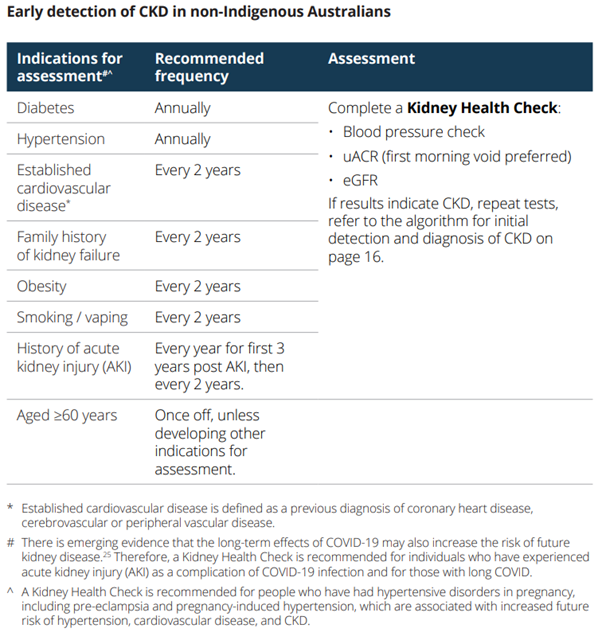
Source: Chronic Kidney Disease (CKD) Management in Primary Care (5th edition). Kidney Health Australia, Melbourne, 2024.
Kidney Health Australia (KHA) Health Professional Hub
The KHA Health Professionals Hub is an online platform where clinicians can register to access resources, news, latest research and educational webinars.
Clinicians can refer patients to KHA via the Kidney Helpline. Referring patients to Kidney Health Australia gives them access to KHA staff to provide relevant information and answers to their questions.
HealthPathways Melbourne
HealthPathways Melbourne is a clinical management and referral resource designed for use during consultations. It gives clinicians a single website to access clinical referral pathways and resources.
Consumer resources
The Kidney Health Australia (KHA) website has several consumer resources to support your patients with understanding and managing CKD.
Highlighted resource from the website: How to Ask for a Kidney Health Check educates consumers who are at risk of CKD and empowers them to ask for a Kidney Health Check.
How to improve accuracy of reports
Data are only extracted from designated fields within the clinical software—not free text progress notes. Using standard codes can improve data quality and report accuracy.
Blood pressure can be captured if it is recorded in the below shown locations in the respective clinical softwares.
Medical Director:
- From within the Clinical Window, select Tools > Tool Box > Blood Pressure. The Blood Pressure tab appears.
- Enter values manually or via a device.
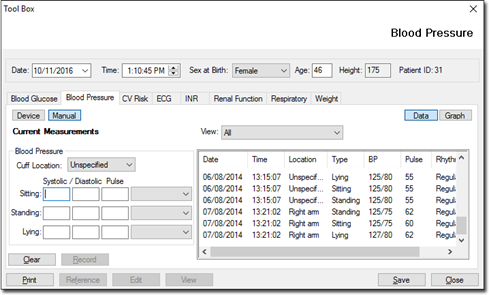
Best Practice:
- From the patient record, select Observations from the tree on the left-hand side.
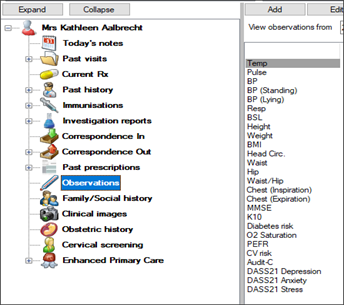
- Click Add in the top-left corner of the observations screen. The Observations screen will appear.
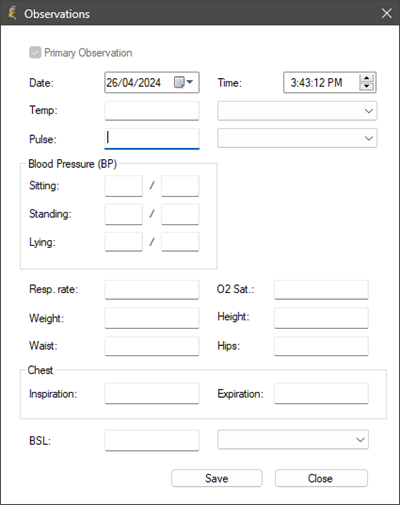
Continuing Professional Development (CPD)
Time spent reviewing the CKD screening report,conducting a mini-audit of 10 patients, and exploring improvement opportunities will contribute towards 12 (6 MO, 5RP and 1EA) CPD hours.
Frequently Asked Questions (FAQs)
- How does this report benefit me and my patients?
The report provides actionable insights based on your practice data, helping you identify patients at risk of CKD and improve early detection, management, and referral pathways. - How did we access the data?
Your practice owner has provided consent for data sharing as part of the Clinical Insights program. Data is securely extracted through POLAR and used solely for quality improvement purposes. - Is my data secure and private?
Yes. All data is handled in accordance with strict privacy and following our protocols. Only de-identified or practice-approved data is used for reporting, and it is never shared externally without consent. - Why don’t my totals add up?
The columns are not mutually exclusive and therefore will not add up. For example, some patients may have diabetes and hypertension and will appear in the first bar but not the others. - How can I access further support/assistance with POLAR?
Email digitalhealth@emphn.org.au for further support, and they will direct you to access the Digital Remote support via teamviewer.